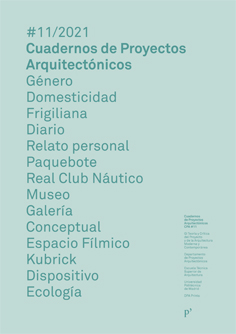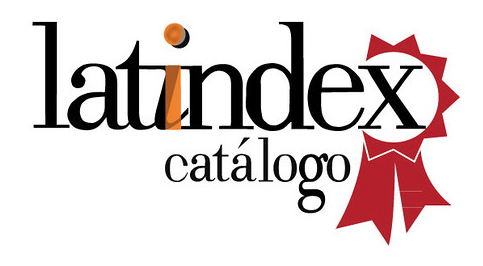Diary 1969: Bernard Rudofsky’s personal account of his discovery of Frigiliana
DOI:
https://doi.org/10.20868/cpa.2021.11.4830Palabras clave:
Bernard Rudofsky, La Casa Frigiliana, Diary, InhabitResumen
Abstract
Bernard Rudofsky dedicated a significant part of his life to exploring a personal and fulfilling way of living, which was reflected in the numerous exhibitions and publications that he produced. Part of this research process was funneled into the various attempts to build a house for himself and his wife Berta, which concluded in the early seventies with the construction of La Casa in Frigiliana. This investigation reveals for the first time, from Rudofsky’s own account in one of his diaries, the challenges and mishaps that surrounded the discovery of the place and its subsequent acquisition by the couple. The article is an attempt to comprehensively reconstruct the couple’s ups and downs in Spain in 1969 by extracting and collating handwritten information from 144 pages of his diaries; information that has not been previously looked into. This article has a three-fold focus: firstly, that of the historical record of this unique event and the important role played by this construction in a biographical key; secondly, that of the meeting of the foreign architect with the Spain of the time, which allows us to imagine what other similar cases may have faced; finally, it is worth highlighting the uniqueness of a project process that includes the place in an intermediate stage and that highlights the intense relationship that exists in this particular case between the house, the environment, the user and designer, and living there.
Descargas
Referencias
Abercrombie, Stanley. "With Summer in View". Interior Design, LV, no. 8, (agosto, 1984): 138-145.
Baller, Inken; Hendreich, Evelyn; Schmidt-Krayer, Gisela. Villa Oro. Berlin / Bonn: Westkreuz Verlag GmbH, 2008.
Bergera Serrano, Iñaki. “Del dibujo a la fotografía de viaje: el caso de Bernard Rudofsky en España”. Coord. Melián García, Ángel. 103- 110. En Actas 15 congreso internacional EGA: El dibujo de viaje de los arquitectos. Las Palmas de Gran Canaria: Universidad de las Palmas de Gran Canaria, 2014.
Iñaki Bergera Serrano. “Spain, photographs without photographer: La mirada analítica de Bernard Rudofsky”, ed. Loren, Mar; ed. Romero, Yolanda. 180-200. Desobediencia crítica a la modernidad. Granada: Centro José Guerrero, 2014.
Bernard Rudofsky papers, ca. 1910-1987, en Series II. Travel notebooks and photographs, cajas 8 y 9.
Bocco, Andrea. Bernard Rudofsky: a humane designer. Nueva York: Springer, 2003.
Capitel, Antón. La arquitectura del patio. Barcelona: Gustavo Gili, 2005.
García-Diego, Héctor, Villanueva, María. “Paradigma, ensayo y conclusión: La Casa de Bernard Rudofsky en tres actos”. VLC Arquitectura, Vol. 5, no. 1 (2018): 153-183.
Lafuente Sánchez, Víctor. A.. “Gio Ponti y Bernard Rudofsky: La casa mediterránea y su representación en la revista Domus”. EGA, no. 26 (2015): 256-265.
Loren Méndez, Mar; Pinzón Ayala, Daniel. “Proceso de ideación de la casa Rudofsky, Frigiliana. El dibujo en la dimensión patrimonial de la obra arquitectónica”. EGA, no. 23 (2014): 162-173.
Loren, Mar; Romero, Yolanda. Bernard Rudofsky: Desobediencia crítica a la modernidad. Granada: Centro José Guerrero, 2014. Pozo, José M.“De cómo el Metropolitan Museum nos ayudóa a ver The Invidible Spain”. Coord.
Pozo Municio, José M.; García-Diego Villarías, Héctor; Caballero, Beatriz. 49-60. En Las exposiciones de arquitectura y la arquitectura de las exposiciones. Pamplona: T6, 2014.
Romero Gómez, Yolanda; Guillén Marcos, Marina. José Guerrero The Presence of Black 1950-1966. Granada: Centro José Guerrero, 2014.
Rudofsky, Bernard. "Non ci vuole un nuovo modo di costruire ci vuole un nuovo modo di vivere", Domus, n° 123, (marzo 1938): 6-15.
Rudofsky, Bernard. "The bread of architecture", Arts and Architecture, no.LXIX (octubre 1952): 27-29 + 45.
Rudofsky, Bernard. “Vivienda en Nerja”, Arquitectura COAM, no. 206-207 (1977): 96-99.
Rudofsky, Bernard. Architecture without Architects: A short introduction to non-pedigreed architecture. Nueva York: The Museum of Modern Art, 1964.
Rudofsky, Bernard. Are Clothes Modern? An essay on contemporary apparel. Chicago: P. Theobald, 1947.
Rudofsky, Bernard. Behind the Picture Window.Nueva York: Oxford University Press, 1955.
Rudofsky, Bernard.Europe 1963A, The Getty Research Institute, Rudofsky papers, ca. 1910-1987, en Series II. Travel notebooks and photographs, caja 8.
Rudofsky, Bernard. Now I Lay Me down to Eat: Notes and footnotes on the lost art of living, Nueva York: Anchor Press-Doubleday, 1980.
Rudofsky, Bernard. Sparta- Sybaris: Keine neue Bauweise, eine neue Lebensweise tut not. Salsburgo: Residenz / VM, 1987.
Rudofsky, Bernard. The Kimono Mind: An informal guide to Japan and to the Japanese.Nueva York: Doubleday, 1965.
Rudofsky, Bernard. The Unfashionable Human Bod. Nueva York: Doubleday, 1971.
Salinas Romón, Pedro R. “La Casa Rudofsky en Frigiliana (Málaga), testamento vital de un filósofoarquitecto”, Boletín De Arte, no. 29 (2018): 549-552.
Ullan, José Miguel. “Nerja: asamblea de pescadores e intelectuales”. El País (24 de agosto de 1980): 14-15.
Welzig, María. “Vienese Interactions”. ed. Zardini, Miko; ed. De Wit, Wim.76- 95. En Lessons from Bernard Rudofsky: life as a voyage, Los Angeles / Viena: Birkhäuser, 2007.
Zardini, Miko; De Wit, Wim. Lessons from Bernard Rudofsky: Life as a voyage.Los Angeles / Viena: Birkhäuser 2007.
Descargas
Publicado
Número
Sección
Licencia
1. Los autores conservan los derechos de autor y garantizan a la revista el derecho de una Licencia Creative Commons Atribución-NoComercial-SinDerivar 4.0 Internacional que permite a otros compartir el trabajo con un reconocimiento de la autoría.
2. Los autores pueden establecer por separado acuerdos adicionales para la distribución no exclusiva de la versión de la obra publicada en la revista (por ejemplo, situarlo en un repositorio institucional o publicarlo en un libro).












